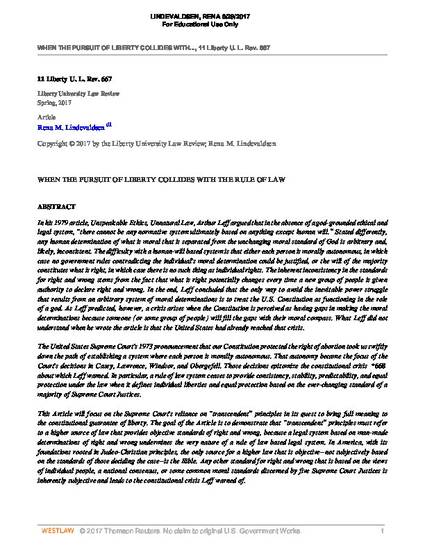
Article
When the Pursuit of Liberty Collides with the Rule of Law
Liberty University Law Review
(2017)
Abstract
In his 1979 article, Unspeakable Ethics, Unnatural Law, Arthur Leff argued that in the absence of a god-grounded ethical and legal system, “there cannot be any normative system ultimately based on anything except human will.” Stated differently, any human determination of what is moral that is separated from the unchanging moral standard of God is arbitrary and, likely, inconsistent. The difficulty with a human-will based system is that either each person is morally autonomous, in which case no government rules contradicting the individual’s moral determination could be justified, or the will of the majority constitutes what is right, in which case there is no such thing as individual rights. The inherent inconsistency in the standards for right and wrong stems from the fact that what is right potentially changes every time a new group of people is given authority to declare right and wrong. In the end, Leff concluded that the only way to avoid the inevitable power struggle that results from an arbitrary system of moral determinations is to treat the U.S. Constitution as functioning in the role of a god. As Leff predicted, however, a crisis arises when the Constitution is perceived as having gaps in making the moral determinations because someone (or some group of people) will fill the gaps with their moral compass. What Leff did not understand when he wrote the article is that the United States had already reached that crisis.
The United States Supreme Court’s 1973 pronouncement that our Constitution protected the right of abortion took us swiftly down the path of establishing a system where each person is morally autonomous. That autonomy became the focus of the Court’s decisions in Casey, Lawrence, Windsor, and Obergefell. Those decisions epitomize the constitutional crisis *668 about which Leff warned. In particular, a rule of law system ceases to provide consistency, stability, predictability, and equal protection under the law when it defines individual liberties and equal protection based on the ever-changing standard of a majority of Supreme Court Justices.
This Article will focus on the Supreme Court’s reliance on “transcendent” principles in its quest to bring full meaning to the constitutional guarantee of liberty. The goal of the Article is to demonstrate that “transcendent” principles must refer to a higher source of law that provides objective standards of right and wrong, because a legal system based on man-made determinations of right and wrong undermines the very nature of a rule of law based legal system. In America, with its foundations rooted in Judeo-Christian principles, the only source for a higher law that is objective--not subjectively based on the standards of those deciding the case--is the Bible. Any other standard for right and wrong that is based on the views of individual people, a national consensus, or some common moral standards discerned by five Supreme Court Justices is inherently subjective and leads to the constitutional crisis Leff warned of.
Part I of this Article presents a summary of Casey, Lawrence, Windsor, and Obergefell, highlighting the Court’s reliance on “transcendent” principles to decide those cases. It explains that the Court’s reliance on transcendent principles has led to arbitrary, man-made law, because the higher law invoked by the Court is in reality the ever-changing moral code of the majority of the Justices on the bench. Part II then discusses the proper foundation for interpreting the U.S. Constitution, highlighting the biblical foundation for our laws and how separation of powers and principles of limited government best protect our liberties. Part III re-analyzes Casey, Lawrence, and Obergefell in light of the objective, transcendent principles that a rule of law system requires.
Keywords
- transcendent principles,
- rule of law,
- separation of powers,
- judicial review,
- Supreme Court
Disciplines
Publication Date
Spring 2017
Citation Information
Rena M Lindevaldsen. "When the Pursuit of Liberty Collides with the Rule of Law" Liberty University Law Review Vol. 11 (2017) p. 667 - 721 Available at: http://works.bepress.com/rena_lindevaldsen/14/
